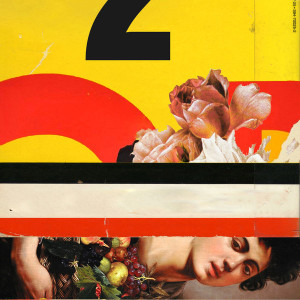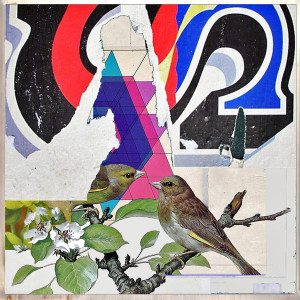Three walls of the room are made of tin, but on the fourth side a polished floor opens, running like fabric into curtains of lace, into wallpapers dotted with flowers, into ceilings pierced with mirror baubles, unicorns, antelopes. A wind chimes from wind kisses. Toys cart-wheel, zigzag, whirr, somersault in a wide, vast expanse. Heaven…!
Ujwala awoke. She had been dreaming once again and as always Madamji’s house had merged with her house, like the wagon of a train.
It was June in Mumbai and the monsoons were here. Ujwala ran out and cupped her palms under the dripping roof and rubbed it over her squinting eyes. She realized she was late again. Plucking a sari from the tin trunk, she bunched the pleats of damp fabric twice over before tucking it under her navel and draping the other end over her bosom. The rain made the nosiest of music like the drumbeats at Ganesha festival or the continuous bursting of fire-crackers during Diwali. On the other side of her window, the wayside sewage drain gurgled to the heavy rain.
Since dawn, ankle-deep water had collected at the mouth of her hut, its tin door cutting a rectangle of black clouds in the dim sky.
Ujwala’s seven-year-old daughter, Chutti, lay sleeping on a mud mound. A trail of water marked its way from the roof to her head as if calibrated by a geometry god. Ujwala stabbed the girl’s stomach with her toes, ‘Wake up, lazy girl. I’m late again for work!’
The matt-haired girl stirred. Today was mother’s pay day. If amma got her money, she would fill the smooth hollowness of all the steel tins with grain and oil. There would be milk as white as a summer cloud in the cup with a question-mark handle. It had been days since Chutti could remember how it tasted. Her mouth flooded with rich lactose-memory as she shuffled out of her stupor.
Outside, Ujwala hurried past tins of kerosene that lent liquid rainbows over the overflow from the gutters. A shop’s clock, whose floors were sunk in water, showed it was 8.30. An hour late! Already! An umbrella with its ribs jutting out of canopy lay by the edge of this shop. Ujwala picked it up and moved on.
Balancing her feet on balding bricks, she waded through the heavy grey current. Her grinding-smooth knees peeped from under the hitch of her sari. A reed-thin man, drenched in his underwear, and a vest as brown as his house stopped and stared at her, as toothpaste foamed his mouth, a blob ready to emit anytime soon.
People from their hovels plunged into the rain with toothbrushes and soap bars overjoyed with a free bath under the sky.
I’d better take the shortcut today, thought Ujwala, turning for an empty, narrow unused lane. From here the high-rises lined faster up in sight.
But wilted vegetable, blood from a butcher’s shop, barber-shop hair, leftover cadaver and entrails of goat, pig, and cow came floating by along with chicken feet and feather, egg shells and fish heads. It surged up her shins like traffic up a busy highway, like gushes of memory.
That’s why everyone sniggered about poultry gully in the rains. Why it had earned a pinched- nose reputation.
Hold. your. breath … get. through. With. this. now. and. never. again.
Exhale s l o w l y. It would be over soon. You should have never been late. Ever. She told herself.
Ujwala recalled vividly her first day at Madamji’s penthouse. The day that ivory-skinned goddess had asked her, in a sing-song voice, ‘Have you looked after children before? Do you have any experience?’
‘Exprian, I have, no. I have three chinren,’ she told Madamji, watching her baby amidst tinkering indigo toys, a turquoise musical set, blue balls, peacock-frocked dolls, and a teddybear in sailor uniform. What a sight that was! The powder blue wallpaper sky of Babyji’s bedroom, violet satin Barbie doll curtains, a periwinkle ceiling with lush cotton clouds, aqua walls with mirror-stickers of unicorns and fairies, and an ultramarine translucent glass chime tinkling at the centre!
‘And where do you live?’
Ujwala had lied about Nava Gaon instead of Khaadi. Khaadi was behind a Garbage Mountain. It had earned its notoriety, because of the way houses there were made of tin and plastic sheet and stuck to each other with shared walls. Only poor immigrants from the countryside lived there. Hearing of it, Madamji might have dismissed her immediately. Nava Gaon, on the other hand, had brick and cement cottages. People who lived there had better jobs and were better off.
“Remember’, Madamji had told her, ‘it is easy to replace you at the end of every month when other maids like you become available. So roll up your sleeves and get to work. I want the best work done. No holiday or leaves in between.” Oh! Babyji’s mother and the way she was wrapped in an aroma of sandalwood like the dancing fragrance of incense sticks near God’s feet. Agarbatti!
As Ujwala sloshed through the gutter, her umbrella upturned into a saucer, jutting its steel veins like an evil grin to a violent wind. Her thighs turned goosefleshy.
Once, when she had come to the basti she had asked, ‘Why does no one ever clean up this place?’ to which a broad tobacco-tooth-stained woman had answered, ‘Because we live here illegally. If they build a road and make this a better place, do you think we will ever go away? How will they get rid of us then?’
Ujwala made Madamji believe she owned a television. She spoke well, remained neat and replied softly to every question, mimicking Madamji’s voice and register, keeping the foul languages of the basti away. She learned to look after the swollen cheeked, swollen-thighed Babyji, all too late after her own children had grown up.
Ujwala relived the days of her children’s infancies, believing with distortion that she too had boiled, pureed and fed mashed rice and vegetables to them, massaged their bodies in warm oil, bathed, cleaned, powdered, groomed, and dressed them in pretty doll-like clothes, meting different toys to them and strolling them in gardens watching evening suns.
She found she knew a lot about baby care. The warmth in her showing up when Babyji slept and she hand-washed her clothes, sterilized her bottles. The inner quietness of her forgotten life unfurling in those long afternoons, meeting in between her eyes in the soft aromatic folds of dried baby clothes, which she dug her face deeply into before folding and arranging them on color-coded shelves and hangers in the colorful Micky Mouse wardrobe.
When Chutti, Ganesh and Gopal were small they were always kept in a corner of the mud house, near the leg of the bed or under it from where they crawled and grew out. In the rush of household cooking, daily food rationing, rushing to clean other people’s homes, running to the lone municipality tap to fill and store water in drums and buckets every night, she had little time for them. Now she understood that attention was luxury. She tried to be as tender to them when she got back home but they were impatient. They had outgrown its need. So she had to take it back to Babyji; someone had to get the love she was discovering in herself.
Well past 9!! This was the latest by which she could have rung Madamji’s doorbell without a half day’s salary cut. The overcast sky followed her over the lanes. In these rains, the lane seemed never-ending, as if the earth had expanded beneath the grime.
By now, Babyji would be amidst tinkering toys, luminescent soap bubbles, bells, dolls, balls, trains, that Madamji might have added to from her alternate-day shopping that was always a joy when introduced to baby.
Ujwala missed a step and plunge-landed into the water like a heavy sack, her hands slaying, touching grunge at the surface. Something slithered over her back, disturbed from its hiding, warm against her cold rain-skin.
What was that?!
It moved fast and it was gone just as fast, leaving her with a shooting pain in the small of her back. Fire branched over the tree of her spine, all over, and percolated at her right hip. Grabbing a fistful of mud and pressing her numb palms and knees over moving silt, she managed to stand up, her sari dripping in sludge.
Babyji’s thick cloth napkins would be changed every hour laundered with citrus, honey, wild rose detergent and then starched pink. Her drool wiped with hand towels as soft as a dove’s coat. Her play area sprayed with jasmine, lotus, lavender and nishigandha perfumes. Her room floor cleaned with rosy-milk disinfectants. Her cot covered in printed rainbow and balloons bedcovers, toys wiped with sanitized handkerchiefs.
The rot of the lane clung to Ujwala’s nose now like bats in a cave. Her throat was frozen. Her sight dimming. She shakily leaned against a wall.
When a clean drizzle sprayed from Madamji’s bathroom sprinkler, running the mud from her tired feet into broken rivulets down azure tiles, Ujwala would answer Madamji’s questions in a hushed echo of the closed bathroom.
“Are the rains bad outside, Ujwala? It looks poetic to me from here.”
“The rains are beautiful, Madamji. As beautiful as you can see.”
She had learnt how not to speak of leaky roofs, rotting clothes, tuberculosis, or mildew. Only things that suited with the beauty of Madamji’s world. Like a surprise jackfruit, bought cheaply from the bazaar, pried open with lots of fresh, juicy seed tale.
Then, scrubbing sweet-smelling loofah over her hands and feet she would blow-dry herself hair to toe. That would be her only bath for the day before she dressed in a blue-bordered sari that Madamji had given every maid an extra pair of.
One hand clutching her waist Ujwala limped now, leaning over a row of musty hovels, their dark mouths open like doors of a train on standstill. She blinked into a blur.
Was she dreaming this all up?
‘We live in a dream,’ she had once told an imaginary Madamji in the bathroom, ‘like fairies on wind chimes star-crossings in window light.’
A bloated rodent floated past as Ujwala’s pace slowed. Her nape felt nonexistent. She wished she could reach her back to at least feel it, to find it, but the rain was making her clumsy. Her throat was dry. Her stomach punched with hunger.
“And what did you have for breakfast today, Ujwala?” Madamji would sometimes ask.
“Idlis, appams, sambhar chutney and garam masla chai,” she would lie. Sometimes, “medu wada, dosa, poha,” winding her pallu tighter over her waist.
But one day Madamji turned generous. She slipped across a bowl with an idli drowned in sambhar. “Have some. So what if you have already eaten? This is a slightly new recipe. Guess what is the new ingredient used in it today…have you heard of avocado?”
When Madamji’s left the kitchen, Ujwala dug out more of the highly spicy curry and another pair of those delicious fluffy rice cakes onto the flower-rimmed bowls kept for Madamji and Sahib.
“What does your husband do?” and “Are your children in school?” Madamji had once asked her, and she had lied about that too. Her husband was a head plumber not the drunk lying in another woman’s house. Like Madamji’s husband, he too had workers under him and he was now on an important contract that would fetch them enough to own the small cottage they lived in, which would also have a kitchen garden like Madamji’s.
‘The rains haven’t affected us much. We have asbestos roof, na? Come to our house someday, Madamji. Bring Babyji along too. / My chinren are faring very well in studies. All of them have scholarships. No, no, we don’t allow our chinren to watch TV, just like you do not allow Babyji to watch. TV destroys the eyes. I agree. It destroys the mind. /Yes, my mother-in-law takes care of my chinren, not the whore who curses me each day.’
Wading through the waters now, Ujwala shut her eyes as her eyelids creased into newer worlds. The skyscrapers on the outskirts of the gulley were columns of mist, a glowing yellow painted in each of its windows and balconies.
How late was it now? Was it evening already?
She asked a passing figure, “Shhhush! Where are the lights, boy? I cannot see anything …”
“There were never any lights here. Dumb or dreaming or what!?” the boy croaked back, spitting in the water.
The sky curdled with grey as if crowding over lost time.
Would her children be safe? Should she rather go and check on them? There was no point carrying on now like this. It must be 10, 11…. Gopal and Ganesh would be back from their early morning jobs, one milking somebody’s buffaloes and the other selling newspapers.
She limped into another gulley.
A large pit sat in between her and the rest of the path. A raakshasa’s teacup it was! Who knew how deep? She could never cross that one!
A few light bulbs in this lane dangled furiously over her head in the drizzle. At least somebody had succeeded in getting electricity into this world, even if stolen! She watched those suffused globes of yellow, blinking profusely as her knees buckled into the greedy silt lips of the teacup. Its outer limits were grossly miscalculated. The whirlpool tugged at her sari, inviting her into its centre, her mind still on those light bulbs and the distant square lights of those grey buildings.
She cycled her legs through the prison of her sari as they set free. There was no base to this pit. “Get me out of here! This is not my lane!!” she screamed. The whirlpool stirred her, increasing its grip around her waist, including her chest, neck, cheek as rain filled the cup of her scream from every direction. Ice spread over her hip. Stiff. She splashed violently. Chutti! Gopal! Ganesh! Bhagwaan! Aaee!! A liquid brown was stirring, veiling the sky from her eyes.
She was riding on the backs of antelopes, looping over pink and white chalk walls to songs playing from a rouge-red gleaming piano. Cling. Clong. Ting. Tong. Hing. Hong. Ting. Tong. Cling. Clong. Ding. Dong.
To Chutti, the only one who still listened, Ujwala would sometimes tell of the houses she worked in, the people she met there. ‘They are all made of paper. Even a slight runny nose, a tear, a vomit was enough to cause a flurry, a collapse of their lives. Their houses were made by us, kept clean by us, run by us. Even their manners of love were different from us. You couldn’t pull a baby by its arm into a sitting position. No turning it topsy turvy or rocking them hard to sleep. No ignoring their wet bums or dry skins. It was all about the softest of responses. The most tender of ways. Paper boats lead carefully across to shore.’
12 noon. On Madamji’s TV headlines ran of an upcoming thunderstorm not too far from the island city’s coast. Its speed predicted at 40 kmph. ‘So today these work-slackers won’t turn up again! Take advantage of the rain, you sluts, you lazy work-chors but tomorrow I shall get you!’ Madamji slumped on the floor, dragged the baby by its thighs, ripped open the shit-filled diaper and flung it across the sprawling drawing room to the nearest dustbin.
Notes:
basti – impoverished settlements
Ganesha festival – the festival of the Elephant God where his statues are taken out in road processions to places of worship and after a few days back through road processions to water bodies to be immersed in. These road processions are like a carnival of dancing and loud music from speakers or live music from drums.
Diwali –the festival of light, also celebrated with fire crackers.
Agarbatti – incense stick
Pallu – the lose end of the sari that covers the bosom and falls over a shoulder
Raakshasa – monster
Ji – used as a suffix to addressing someone with respect, in the Hindi language.
Work-chor – work slacker
___
The featured image accompanying this short story, entitled ‘Paper Boats in the Rain’, has been used with the permission of artist, Kapie Eipak.





